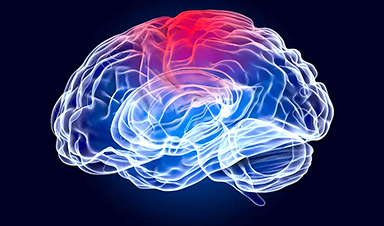Clinical studies reveal extended survival in diffuse midline glioma patients receiving ONC201 treatment; research also explains the underlying mechanism of the drug’s success.
For the first time, a potential drug candidate has been identified by researchers that show promise in improving outcomes for patients suffering from a specific type of childhood brain tumor that currently lacks effective treatment options. The compound, named ONC201, was observed to nearly double the survival rates for patients diagnosed with diffuse midline glioma (DMG) or diffuse intrinsic pontine glioma (DIPG) when compared to prior patient outcomes.
The findings are reported by an international team of researchers led by the University of Michigan Health Rogel Cancer Center and the Chad Carr Pediatric Brain Tumor Center.
In addition to reporting on the results of two early-stage clinical trials, the paper reveals the underlying mechanisms behind the compound’s success in these tumors. The paper is published in Cancer Discovery, a journal of the American Association for Cancer Research.
“It’s an incredibly difficult tumor to treat,” said senior author Carl Koschmann, M.D., associate professor of pediatric neuro-oncology and clinical scientific director of the Chad Carr Pediatric Brain Tumor Center at Michigan Medicine. “Prior to this study, there have been more than 250 clinical trials that have not been able to improve outcomes. This is a major crack in the armor.”

A series of brain scans show a tumor shrinking in response to ONC201. Credit: Michigan Medicine
In two clinical trials testing ONC201 in a total of 71 patients with H3K27M-mutated diffuse midline gliomas, the median overall survival was nearly 22 months for tumors that had not recurred at the time of enrollment. Almost a third of the patients lived longer than two years.
ONC201 took an unusual path to a clinical trial. Initially designed to target dopamine receptors, which are upregulated in many different tumors, researchers saw that the drug passes the blood-brain barrier, one of the biggest challenges to designing drugs for brain tumors. Initial trials in glioblastoma were not successful, but a small number of patients with DMG that carried the H3K27M mutation had more promising results. Without understanding why it worked better in these patients, a phase 1 trial was started in children and young adults with H3K27M-mutated DMG.
Meanwhile, Koschmann and co-author Sriram Venneti, M.D., Ph.D., were trying to figure out what was happening in these tumor cells
Through the trial, they collected cerebrospinal fluid from patients. They used this fluid to analyze metabolic changes and found ONC201 got into the tumor cells and affected mitochondria. Patients who responded to the drug had an increase in a metabolite called L-2HG produced by tumor cells.
Koschmann called the finding “very much unexpected.” The team found that increased L-2HG reversed tumor-defining epigenetic signals causing tumor cells to differentiate more and divide less. The longer patients were on ONC201, the more tumors exhibited these epigenetic reversals.
“This could explain why this patient population was responding so well to the drug because it had this specific epigenetic abnormality that could be turned off by ONC201. The tumors have an epigenetic change caused by the H3K27M mutation and ONC201 metabolically undoes that change,” said Venneti, associate professor of pathology and pediatrics and scientific research director of the Chad Carr Pediatric Brain Tumor Center at Michigan Medicine.
Additional clinical trials are currently underway, including testing ONC201 in combination with other therapies. Researchers at U-M’s Chad Carr Pediatric Brain Tumor Center are also continuing to look at ways to overcome resistance to ONC201 by using drug combinations.
Koschmann notes that even a near-doubling of survival is not enough for families of patients with this diagnosis, as the tumor remains very lethal. But he hopes this first step will lead to bigger leaps in the future.
“For now we have this patient population that didn’t have a drug before, and now we see many of the tumors responding. We have a platform to build on and we can also explain why it’s working,” he said.
“We are really excited about this study and envision ONC201 becoming the standard of care for these patients in the near future,” Venneti said.
News
Global Nanomaterial Regulation: A Country-by-Country Comparison
Nanomaterials are materials with at least one dimension smaller than 100 nanometres (about 100,000 times thinner than a human hair). Because of their tiny size, they have unique properties that can be useful in [...]
Pandemic Potential: Scientists Discover 3 Hotspots of Deadly Emerging Disease in the US
Virginia Tech researchers discovered six new rodent carriers of hantavirus and identified U.S. hotspots, highlighting the virus’s adaptability and the impact of climate and ecology on its spread. Hantavirus recently drew public attention following reports [...]
Studies detail high rates of long COVID among healthcare, dental workers
Researchers have estimated approximately 8% of Americas have ever experienced long COVID, or lasting symptoms, following an acute COVID-19 infection. Now two recent international studies suggest that the percentage is much higher among healthcare workers [...]
Melting Arctic Ice May Unleash Ancient Deadly Diseases, Scientists Warn
Melting Arctic ice increases human and animal interactions, raising the risk of infectious disease spread. Researchers urge early intervention and surveillance. Climate change is opening new pathways for the spread of infectious diseases such [...]
Scientists May Have Found a Secret Weapon To Stop Pancreatic Cancer Before It Starts
Researchers at Cold Spring Harbor Laboratory have found that blocking the FGFR2 and EGFR genes can stop early-stage pancreatic cancer from progressing, offering a promising path toward prevention. Pancreatic cancer is expected to become [...]
Breakthrough Drug Restores Vision: Researchers Successfully Reverse Retinal Damage
Blocking the PROX1 protein allowed KAIST researchers to regenerate damaged retinas and restore vision in mice. Vision is one of the most important human senses, yet more than 300 million people around the world are at [...]
Differentiating cancerous and healthy cells through motion analysis
Researchers from Tokyo Metropolitan University have found that the motion of unlabeled cells can be used to tell whether they are cancerous or healthy. They observed malignant fibrosarcoma [...]
This Tiny Cellular Gate Could Be the Key to Curing Cancer – And Regrowing Hair
After more than five decades of mystery, scientists have finally unveiled the detailed structure and function of a long-theorized molecular machine in our mitochondria — the mitochondrial pyruvate carrier. This microscopic gatekeeper controls how [...]
Unlocking Vision’s Secrets: Researchers Reveal 3D Structure of Key Eye Protein
Researchers have uncovered the 3D structure of RBP3, a key protein in vision, revealing how it transports retinoids and fatty acids and how its dysfunction may lead to retinal diseases. Proteins play a critical [...]
5 Key Facts About Nanoplastics and How They Affect the Human Body
Nanoplastics are typically defined as plastic particles smaller than 1000 nanometers. These particles are increasingly being detected in human tissues: they can bypass biological barriers, accumulate in organs, and may influence health in ways [...]
Measles Is Back: Doctors Warn of Dangerous Surge Across the U.S.
Parents are encouraged to contact their pediatrician if their child has been exposed to measles or is showing symptoms. Pediatric infectious disease experts are emphasizing the critical importance of measles vaccination, as the highly [...]
AI at the Speed of Light: How Silicon Photonics Are Reinventing Hardware
A cutting-edge AI acceleration platform powered by light rather than electricity could revolutionize how AI is trained and deployed. Using photonic integrated circuits made from advanced III-V semiconductors, researchers have developed a system that vastly [...]
A Grain of Brain, 523 Million Synapses, Most Complicated Neuroscience Experiment Ever Attempted
A team of over 150 scientists has achieved what once seemed impossible: a complete wiring and activity map of a tiny section of a mammalian brain. This feat, part of the MICrONS Project, rivals [...]
The Secret “Radar” Bacteria Use To Outsmart Their Enemies
A chemical radar allows bacteria to sense and eliminate predators. Investigating how microorganisms communicate deepens our understanding of the complex ecological interactions that shape our environment is an area of key focus for the [...]
Psychologists explore ethical issues associated with human-AI relationships
It's becoming increasingly commonplace for people to develop intimate, long-term relationships with artificial intelligence (AI) technologies. At their extreme, people have "married" their AI companions in non-legally binding ceremonies, and at least two people [...]
When You Lose Weight, Where Does It Actually Go?
Most health professionals lack a clear understanding of how body fat is lost, often subscribing to misconceptions like fat converting to energy or muscle. The truth is, fat is actually broken down into carbon [...]





















